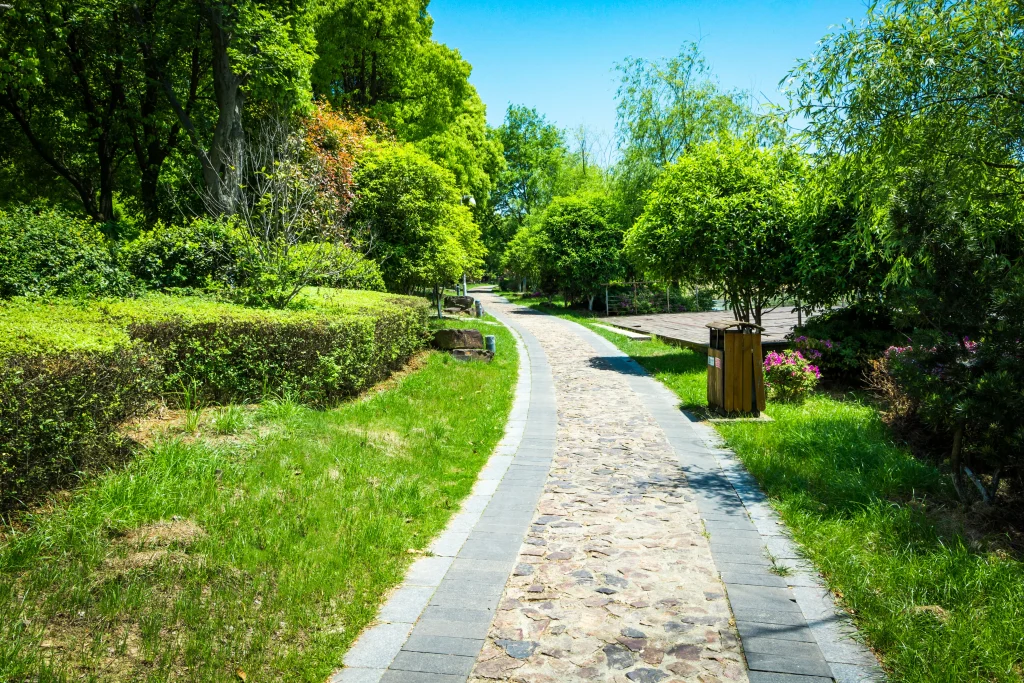Denver lawns face unique challenges that demand precise fertilization timing. The Mile High City’s dry climate, cold winters, and clay-heavy soil create specific conditions that affect when and how you should nourish your grass.
Following a Denver-specific lawn fertilizer schedule ensures your lawn receives essential nutrients during critical growth periods while protecting it from heat stress and winter damage.
Best Time to Fertilize Your Lawn in Denver
The optimal times to fertilize Denver lawns are early spring (March-April) and early fall (September), with additional applications in late spring and late fall for comprehensive care.
- Cool-season grasses (Kentucky bluegrass, fescue, ryegrass) dominate Denver landscapes. These varieties thrive when temperatures range between 60-75°F, making early spring and fall their primary growth periods. Cool-season grasses benefit most from fertilization during these moderate temperature windows when they actively grow roots and shoots.
- Warm-season grasses (buffalo grass, blue grama) perform best in temperatures between 80-95°F. These native options require fertilization later in spring after soil temperatures consistently reach 65°F. Their nutrient needs peak during summer months when cool-season varieties often struggle.
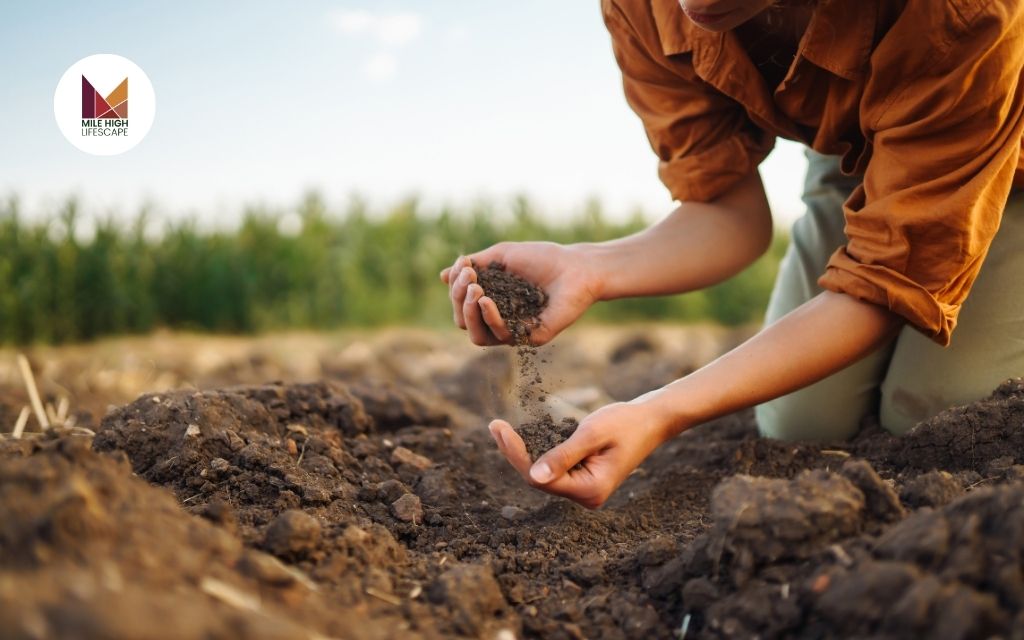
Month-by-Month Lawn Fertilizer Schedule for Denver
Early Spring (March-April)
Apply a pre-emergent fertilizer with crabgrass preventer when soil temperatures reach 50-55°F. This combination product feeds emerging grass while preventing crabgrass seeds from germinating. Choose a fertilizer with a balanced NPK ratio (such as 24-0-4) that provides necessary nitrogen without excessive growth that could stress grass during spring temperature fluctuations. In Denver, this application typically happens in late March or early April, depending on the year’s weather patterns.
Late Spring (May)
Apply a slow-release nitrogen fertilizer with higher nitrogen content (such as 30-0-3) after the lawn’s first few mowings. This supports the vigorous growth period while minimizing the risk of fungal diseases that thrive in warmer weather. Include iron supplements if your lawn shows signs of yellowing due to Denver’s alkaline soil conditions. Complete this fertilization before temperatures consistently reach above 80°F to avoid stressing the grass.
Summer (June-August)
Minimize fertilizer applications during Denver’s hot months. If necessary, apply a light application (half-strength) of slow-release nitrogen in early summer, focusing on struggling areas. Consider organic options like compost tea that provide gentle nutrition without forcing growth during stress periods. Water thoroughly after any summer fertilization to prevent burning.
Early Fall (September)
Apply the year’s most important fertilizer treatment in early fall when temperatures moderate but grass still grows actively. Use a fertilizer higher in phosphorus and potassium (such as 22-3-14) to encourage root development and cold hardiness. This application prepares the lawn for winter and supports the robust root growth that occurs during fall months.
Late Fall (October-November)
Apply a winterizer fertilizer high in potassium (such as 24-0-12) after the final mowing but while grass remains green. This final feeding strengthens roots throughout winter and provides nutrients for early spring green-up. In Denver, this application typically occurs in late October or early November, before the ground freezes but after top growth has slowed.
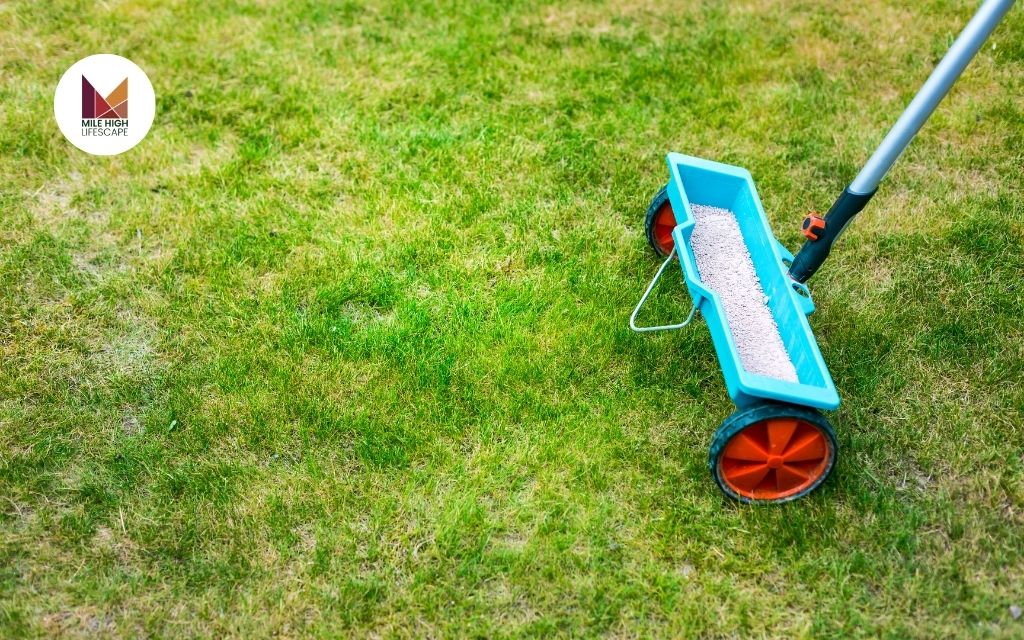
How Often to Fertilize Your Lawn in Denver?
Denver lawns typically require 3-5 fertilizer applications annually, depending on your lawn care goals and grass type. Consider these approaches based on your maintenance commitment:
Minimal Approach (3 applications per year)
For homeowners seeking basic lawn maintenance, focus on three critical applications: early spring (1/2 to 1 pound of nitrogen per 1,000 square feet), early fall (1 pound of nitrogen per 1,000 square feet), and late fall (1 pound of nitrogen per 1,000 square feet). This schedule provides essential nutrition during key growth periods while minimizing maintenance requirements.
Moderate Approach (4 applications per year)
Add a late spring application to the minimal schedule to support summer stress resistance (1 pound of nitrogen per 1,000 square feet). This moderate plan balances effective nutrition with practical maintenance requirements, making it ideal for most Denver homeowners.
Intensive Approach (5 applications per year)
Include a light midsummer feeding to the moderate schedule for lawns with heavy use or those recovering from damage (1/2 to 1 pound of nitrogen per 1,000 square feet). This comprehensive approach maximizes turf density and color but requires more precise timing and application techniques.
Several factors influence fertilization frequency, including:
- Soil composition (Denver’s clay soils hold nutrients longer than sandy soils)
- Irrigation systems (properly watered lawns use fertilizer more efficiently)
- Grass type (cool-season varieties need different schedules than warm-season grasses)
- Lawn usage (areas with children, pets, or heavy foot traffic benefit from additional feedings)
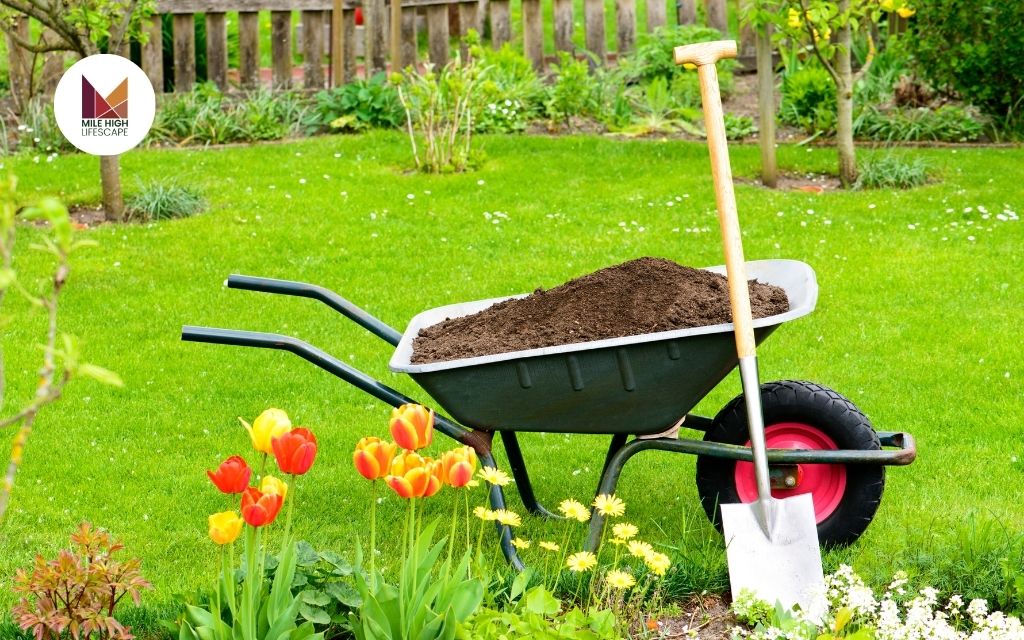
Best Fertilizers for Denver Lawns
Slow-Release Nitrogen Fertilizers
Denver’s best lawn fertilizers feature controlled-release nitrogen that feeds grass gradually over 6-8 weeks. These products prevent the rapid growth flushes that can weaken grass and increase water requirements. Look for fertilizers containing polymer-coated or sulfur-coated urea that release nutrients based on soil temperature and moisture conditions.
Fall Fertilizers with Phosphorus
Fall applications benefit from phosphorus content that supports root development. While Colorado restricts phosphorus use in routine fertilizers, products labeled for “new lawns” or “root development” contain this essential nutrient. Apply these specially formulated fertilizers during September when root growth peaks in preparation for winter.
Winterizer Fertilizers
High-potassium winterizers strengthen cell walls and improve cold tolerance in grass plants. These specialized formulations, typically with NPK ratios like 24-0-12, provide critical nutrients that grass stores in roots throughout winter. Apply winterizers before the ground freezes but after top growth slows to maximize effectiveness.
Organic Options
Organic fertilizers like compost, alfalfa meal, and poultry manure provide slow-release nutrition while improving soil structure. These options work particularly well in Denver’s clay soils by enhancing microbial activity and water retention. Consider organic products during summer months when gentle nutrition prevents stress during high temperatures.
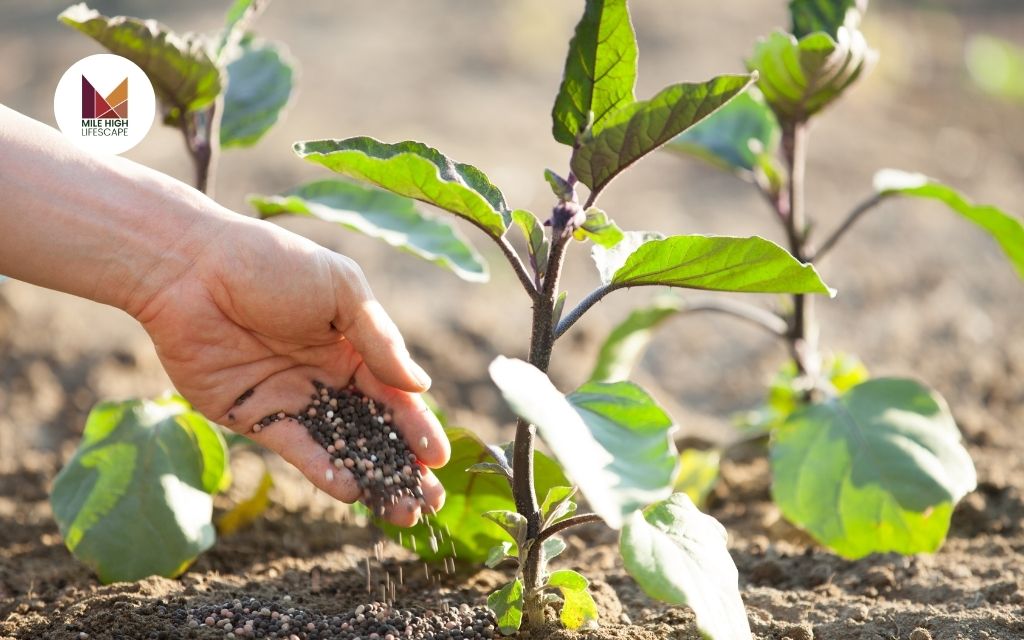
Conclusion
Denver’s unique climate demands a specialized approach to lawn fertilization. Following this regional schedule—early spring pre-emergent, late spring feeding, early fall root support, and late fall winterizing—provides your grass with nutrition when it matters most. Remember that proper timing maximizes effectiveness while minimizing environmental impact and unnecessary expense.
Assess your lawn’s specific conditions, including soil composition, grass types, and use patterns, to fine-tune this schedule for optimal results. While DIY fertilization works for many homeowners, professional guidance ensures precision application tailored to your property’s unique needs.
Contact Mile High Lifescape at (303) 877-9091 for a free consultation. Our Denver lawn care experts will create a customized fertilization plan that transforms your lawn while saving you time and effort.
Frequently Asked Questions (FAQs)
When is the best time to fertilize in Denver?
For cool-season grasses common in Denver, focus on early spring (March-April), late spring (May), early fall (September), and late fall (October-November). Avoid fertilizing during Denver’s hottest summer months.
How many times should I fertilize each year?
Most Denver lawns require 3-5 applications annually. Three applications (early spring, early fall, late fall) provide basic nutrition, while additional applications support higher-maintenance lawns.
Can I fertilize my lawn before snow or rain?
Light rain after fertilization helps nutrients reach the soil without washing away. Apply fertilizer 24-48 hours before expected light precipitation. However, avoid application before heavy rainfall or snow that could cause runoff.
What is the best fertilizer brand for Colorado lawns?
Look for slow-release formulations specifically labeled for mountain or high-altitude regions. Brands like Scotts Mountain States, Revive, and fertilizers from local garden centers often contain micronutrients targeted for Denver’s alkaline soils.
Is summer fertilizing necessary in Denver?
Summer fertilization proves unnecessary for established cool-season lawns in Denver. However, newly seeded areas or warm-season grasses may benefit from light applications during early summer.
